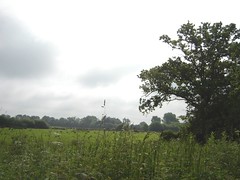
open your mind
We already have a language for the topgraphy of online space that is expressed in th way we refer to the flow of information which we either up- or down-load. Similarly, in describing our connection, like turmimg on water or electricity, we are either on or off. Yet the popular description of going online does seem to suggest that logging on is a point of departure and the question "are you online?" compares well with location-based questions like "are you in the garden?". In screen navigation we borrow the language of print to describe directionality, with up and down, and forwards and backwards. In contrast we open up programmes or new windows and go into or click through screens as if we are actually going somewhere. Somewhere we can walk through or have a look around. But also we personalise our space, we decorate it or protect it with passwords. These spaces become the more intimate places of online worlds. Perhaps we should also consider the folders on our desktop as private space. Are they like the wardrobes and desk-drawers that Bachelard writes about: "...hybrid objects, subject objects. Like us, through us and for us, they have a quality of intimacy."? (1994:77)
No comments:
Post a Comment